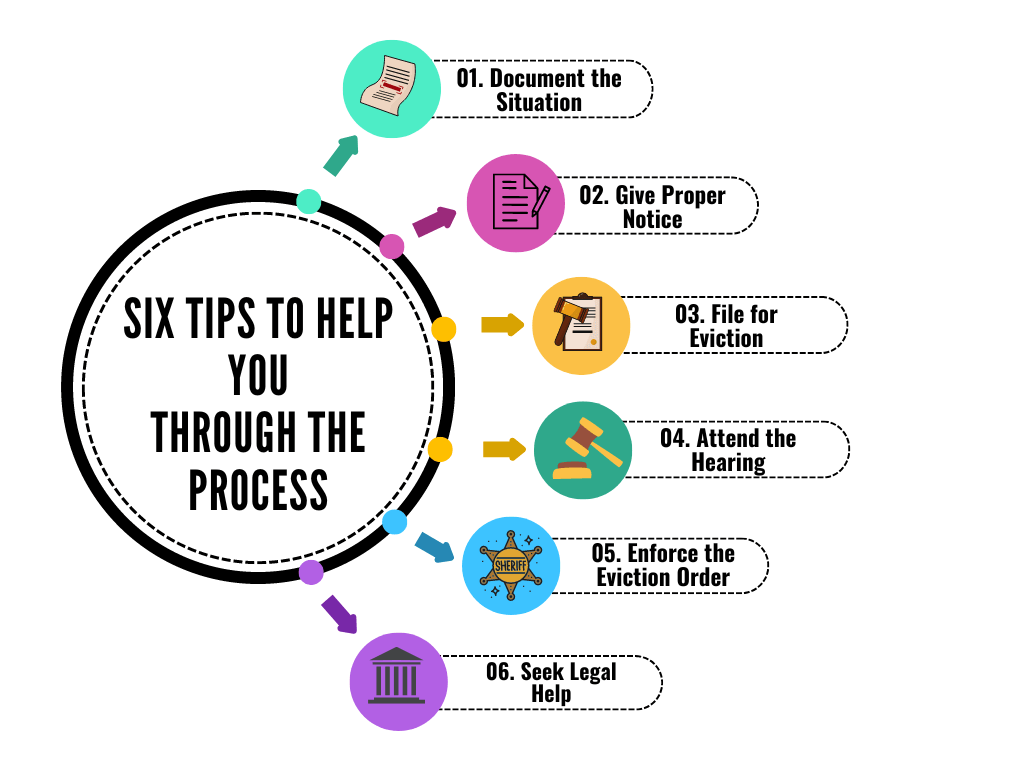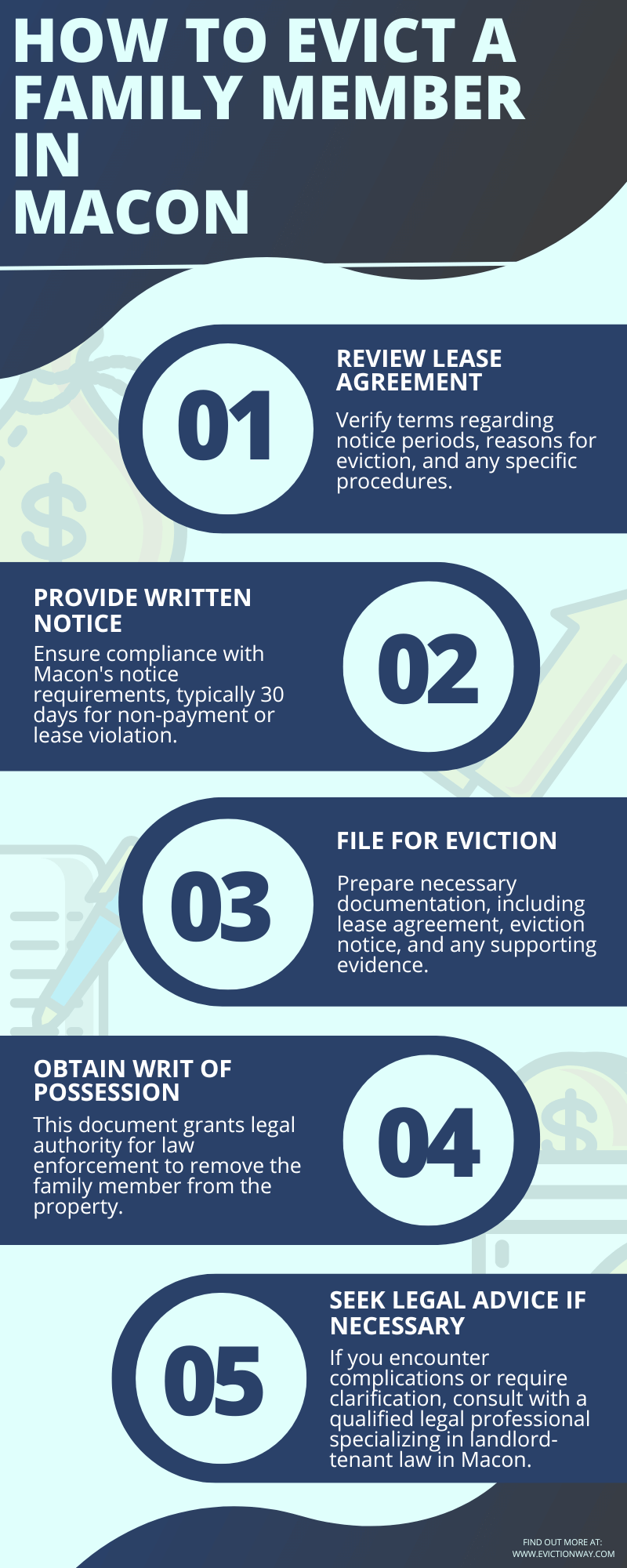If you’re facing the difficult situation of needing to evict a family member in Macon, this article will guide you through the process. We’ll cover the best way to approach the situation, including the legal steps you need to take.
Evicting a family member can be a complex and emotional process, but it’s important to remember that you have rights as a property owner. We’ll provide you with the information you need to navigate the legal complexities involved in evicting a family member, including the specific laws that apply in Macon.
In addition to the legal aspects, we’ll also share tips on how to remove a family member politely and respectfully. We’ll cover everything from communicating your decision to packing their belongings, and we’ll provide legal tips to help you protect your rights throughout the process.

How To Evict a Family Member In Macon
Evicting a family member can be a difficult and emotional process, but it is sometimes necessary to protect your rights and property. If you are considering evicting a family member in Macon, here are six tips to help you through the process:
1. Document the Situation
Keep a record of all interactions with your family member, including any incidents of violence, threats, or property damage. This documentation will be helpful if you need to file for an eviction order.
2. Give Proper Notice
In Georgia, you must give your family member at least 30 days’ written notice before you can file for eviction. The notice must state the reason for the eviction and the date by which your family member must vacate the property.
3. File for Eviction
If your family member does not vacate the property after receiving the notice, you can file for eviction in Macon Magistrate Court. The court will hold a hearing to determine whether or not to grant the eviction order.
4. Attend the Hearing
It is important to attend the eviction hearing and present your case to the judge. Be prepared to provide evidence of the reasons for the eviction, such as the documentation you have kept.
5. Enforce the Eviction Order
If the judge grants the eviction order, you will need to have it enforced by the sheriff’s office. The sheriff will remove your family member from the property and return possession to you.
6. Seek Legal Help
If you are having difficulty evicting a family member, you should seek legal help. An attorney can help you understand your rights and guide you through the eviction process.

Additional Resources for Macon eviction help:
30 days eviction notice Macon
In Macon, a 30-days notice to quit for non-payment of rent is a document used by landlords to inform tenants they’ve missed rent. It gives the tenant 30 days from the date they receive the notice to do one of two things:
- Pay the rent in full
- Vacate the property
If the tenant doesn’t comply within the 30 days, the landlord can then proceed with filing an eviction lawsuit in court.
You can download 30 days eviction notice Macon here.
How Much Does it Cost to Evict a Family Member in Macon?
Evicting a family member can be a difficult and expensive process. The cost of eviction will vary depending on the specific circumstances of the case, but there are some general costs that you can expect to incur.
| Fee | Estimated Cost | Notes |
|---|---|---|
| Filing Fee | $100 – $200 | This covers filing and docketing the complaint, including service of process for one defendant. |
| Service of Process | $50 (per additional defendant) | This is the fee charged by the sheriff to serve legal documents on each defendant. The cost may be higher for complex service methods. |
| Attorney Fee | $1,500 – $3,000+ | Attorney fees can vary greatly depending on the experience of the attorney, the complexity of the case, and the number of hours required. |
| Court Fees | Varies | There may be additional court fees associated with specific filings or procedures throughout the case. |
- Filing fees: The first step in the eviction process is to file a complaint with the court. The filing fee for an eviction complaint in Macon is $100 – $200.
- Service of process: Once the complaint has been filed, it must be served on the tenant. The cost of service of process is $50.
- Attorney fees: If you hire an attorney to represent you in the eviction process, you will be responsible for their fees. Attorney fees can vary widely, so it is important to get a quote from an attorney before hiring them.
- Court costs: If the case goes to trial, you will be responsible for court costs. Court costs can include the cost of the bailiff, the court reporter, and other expenses.
The total cost of evicting a family member in Macon can range from a few hundred dollars to several thousand dollars. It is important to factor in all of the potential costs before you begin the eviction process.

FAQs: Evicting a Family Member in Macon
Here are some of the most frequently asked questions about evicting a family member in the Macon:
What are the legal grounds for evicting a family member in Macon?
In Macon, you can evict a family member if they have violated the terms of their lease or tenancy agreement, such as by failing to pay rent or causing damage to the property. You can also evict a family member if they are engaging in illegal activities or if they are causing a nuisance to other tenants or neighbors.
Can I evict a family member if they are not on the lease?
Yes, you can evict a family member even if they are not on the lease. However, you will need to prove that the family member is a tenant in the property.
You can do this by showing that the family member has been living in the property for a period of time, that they have been paying rent, or that they have been using the property as their primary residence.
How hard is it to evict someone in Georgia?
Evicting a tenant in Georgia can be complex due to specific legal procedures and timelines that must be followed. Landlords must have valid grounds for eviction and adhere to proper notice requirements.
What is the Dispossessory process in Georgia?
The dispossessory process is the legal procedure for eviction in Georgia. It involves filing a dispossessory affidavit, serving the tenant with a summons, and attending a court hearing.
How to answer an eviction notice in Georgia?
If you receive an eviction notice, carefully review the reason for eviction and any deadlines. Seek legal advice to understand your options and rights as a tenant.
How to stop eviction in Georgia?
To stop an eviction, tenants can try to resolve the issue with the landlord, seek legal assistance, or present a valid defense in court. Options may include curing the lease violation or demonstrating compliance with the lease terms.
How long is a writ of possession good for in GA?
A writ of possession in Georgia is typically valid for seven days, allowing law enforcement to remove the tenant and their belongings from the property.
What are the rights of a month to month tenant in Georgia?
Month-to-month tenants in Georgia have the right to proper notice before eviction or rent increases. They are also entitled to habitable living conditions and the return of their security deposit, minus any allowable deductions.
How to appeal an eviction in Georgia?
Tenants have the right to appeal an eviction decision through the court system. The appeal process typically involves filing a notice of appeal and presenting arguments before a higher court.
How long does it take to evict someone in Georgia?
While the average eviction process can range from 14 to 80 days, it’s crucial to follow the correct steps and ensure everything is done properly.
What are some resources for help with evicting a family member in Macon?
There are a number of resources available to help you with evicting a family member in Macon. You can contact the Macon Housing Authority, the Georgia Legal Services Program, or the Georgia Department of Community Affairs for assistance.
Related:
How to Evict a Family Member in Richmond
